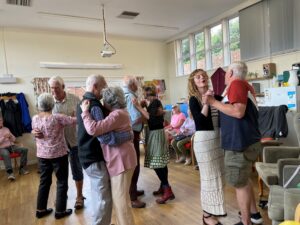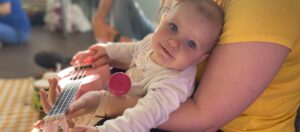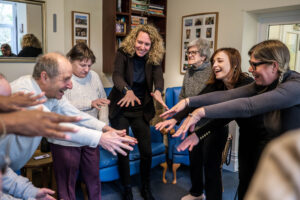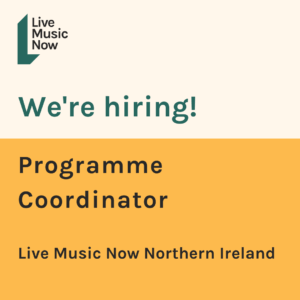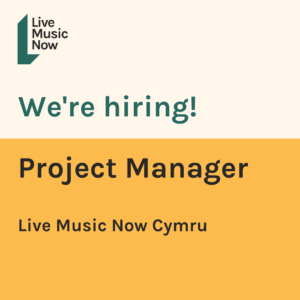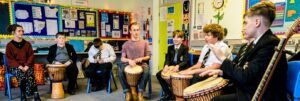During the music sessions, students have learnt to take turns, to listen to each other and to share ideas without the worry of being laughed at or dismissed. Their self-esteem and confidence has increased. Partner School, 2018.
We are delighted to announce that Paul Hamlyn Foundation have awarded us a four-year grant from their Arts-based learning fund for our Musician in Residence programme.
This programme enables Live Music Now musicians to work with a partner school for a year, creating new musical opportunities for children and young people with additional needs, which in turn support their learning and wellbeing. The funding has been matched by regional and national funders including MVAT (South Yorkshire), Stoller Charitable Trust (Oldham), John Lewis Foundation (national) and Sir William Boreman’s Foundation (London).
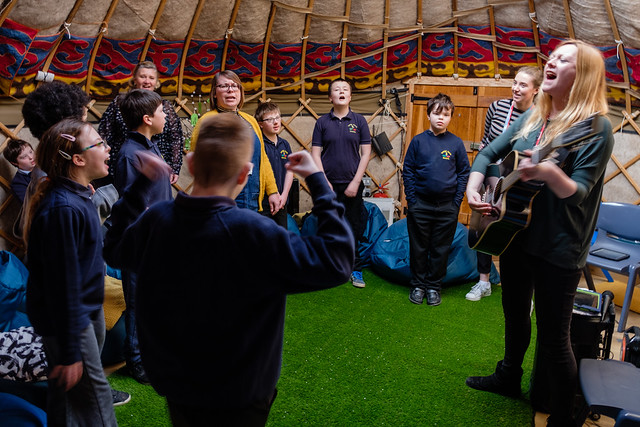
Sadie Fleming, Musician in Residence, leading a session in the school yurt at Three Ways School, Bath
Not only is music an enjoyable activity in its own right, but extensive research shows that regular participation in musical activities can have a positive impact on children’s cognitive, social, emotional and physical development. These benefits are particularly relevant for children and young people with learning disabilities, especially those with profound and multiple learning disabilities. For example, Professor Adam Ockelford’s research suggests that as many as 1 in 20 children with autism may have exceptional musical talent. You can watch a short film with Adam talking about “Why Music is Important” here.
Yet, music provision in schools can be patchy (schools say this is due to budget constraints, pressure on school timetables, lack of musical expertise amongst staff). In a survey of 100 special schools visited by LMN musicians last year, only 11% schools had a full-time music specialist on their staff, though most schools highly valued music.
Live Music Now has been enriching music provision for pupils with additional needs for many years through our participatory concerts, workshops and creative music projects. We train our musicians to deliver this work using our SEND Inspire training pathway. The Musician in Residence model enables our more experienced LMN musicians with a passion for inclusive music practice to embed themselves in a school for a full year. Over the past three years, we have refined the model to bring increased benefits for pupils, school staff and LMN musicians. The three main aims of the programme are:
- Supporting pupils to progress as musicians.
During the year, the resident musician works with groups of pupils to explore instruments and voices, and helps them to create and perform their own music. Participation in musical activities often promotes deeper levels of pupil engagement than observed in other classroom activities and can open up new ways to learn. It also offers opportunities for pupils to express themselves, build confidence and have fun with their peers!
“One non-verbal student with Autistic Spectrum Condition would sing every session using the microphone. This was a big achievement for her as she finds it hard to sit and engage, let alone take part, actively using her voice.” Teacher
“One student’s singing progressed to the point she could use dynamics more and sing more expressively, to a very high standard we did not expect”. Teacher
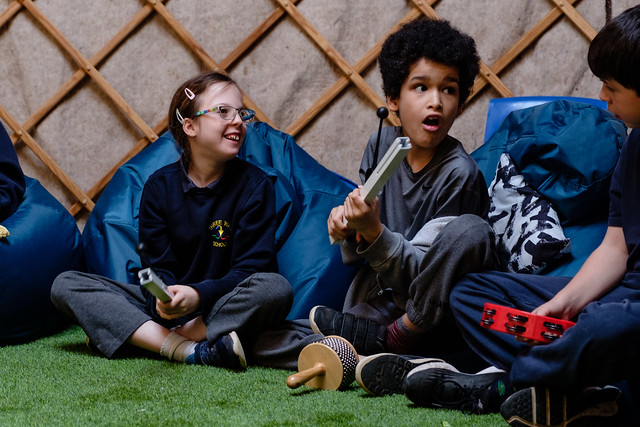
Musical turn-taking in the school yurt!
2. Improving LMN musicians’ skills and knowledge as inclusive music leaders.
The musicians work closely with school staff to deliver their music sessions, learning to engage and communicate with pupils with a range of needs and interests. They are supported by a specialist mentor and attend group training sessions to share their learning and experience. In the longer term, our programme is helping to expand the workforce of trained professional musicians available to deliver inclusive music sessions within the music education system.
“It has been really great to spend a year working closely with children in my host school. I got a much better understanding about differentiation of activities for pupils with wide ranging abilities, an understanding of the workings of an SEN school and how my role can impact the wider work in the school”. Live Music Now Musician.
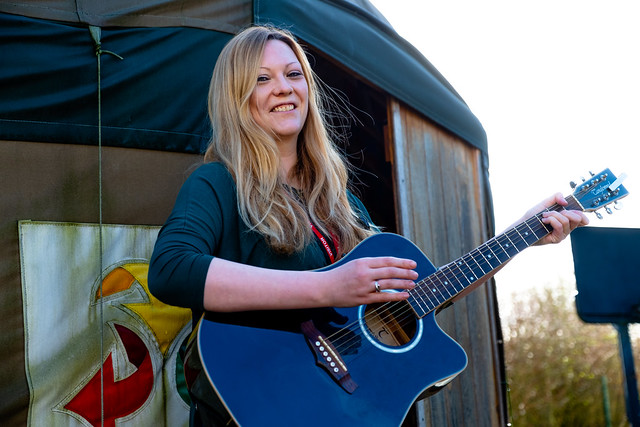
Sadie Fleming, Musician in Residence 2019
3. Supporting schools to enhance future music provision
An important legacy from the programme is through developing staff knowledge and musical experience. During the year, school staff, particularly those who aren’t music specialists, have the opportunity to work closely with the Musician in Residence; this helps them build musical skills and gain confidence to use music more regularly in their classrooms.The programme also supports staff to identify and support musically gifted pupils and demonstrates how music-making can be used to support wider school priorities.
“These opportunities to learn alongside musicians raises standards and helps to promote the use of music with the children”. Partner School.
“I’m personally inspired, I bought a loop pedal to develop vocalisations. I’ve also gained an increased awareness of the joy music brings to the classroom and the children”. Class Teacher.
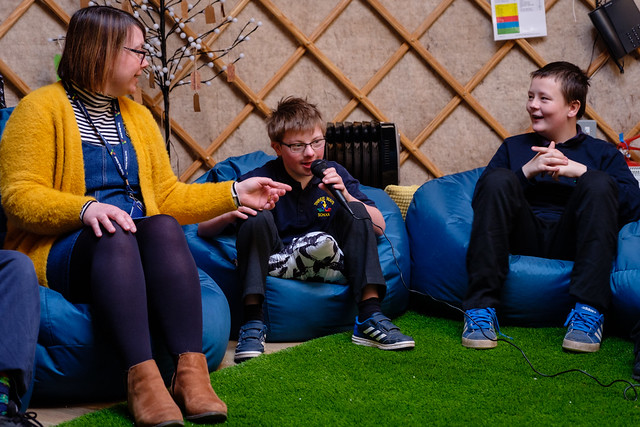
Staff member supporting pupils in a music session, Three Ways School
Sounds of Intent
We use the unique Sounds of Intent framework – a resource supporting the musical development of children and young people with learning disabilities – to underpin our work. The Framework is based on ten years of research led by Professor Adam Ockelford and colleagues, and enables teachers, parents and musicians to assess a child’s musical abilities and support their progression as a musician. www.soundsofintent.org
New Musical Activities Resource
During the next four years, we will be working with Caroline Waddington-Jones and Sounds of Intent to develop a new Live Music Now resource to support delivery of musical activities for children with complex needs. These activities will be informed by musicians and staff in the participating schools and piloted during the first two years of the programme.
Participating schools and LMN musicians for 2019 are:
- Hexham Priory School (Northumberland) working with Dave Gray (Melodeon)
- Hill Top School (Sheffield) working with Will Fletcher (Drums)
- Kingfisher School (Oldham) working with Dan White (Saxophone)
- New Bridge School (Oldham) working with Paul Exton-McGuinness (Trombone)
- Watergate School (London) working with Luiz Morais (Guitar)
- Tuke School (London) working with Mary Reid (Harp)
- Mapledown School (London) working with Rachel Hayter (Flute)
- Three Ways School (Bath) working with Sadie Fleming (Singer/Songwriter)
- Maes Ebbw School (Newport) working with Daisy Evans (Clarinet)
Advisors and Trainers
We are very grateful to our expert advisors supporting the programme through our SEND Advisory Group and to the trainers and mentors supporting our musicians:
- Ros Hawley – lead trainer and consultant.
- Mentors – Bea Hubble, Caroline Waddington-Jones, Adam Featherstone, Alex Lupo, Graham Dowdall and Sophie Grey.
- Academic Advisor – Professor Adam Ockelford
- External Evaluator – Sound Connections
Photo credit: Evan Dawson
